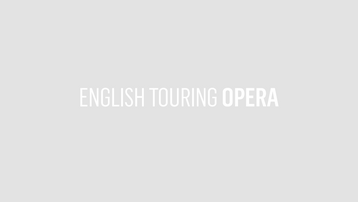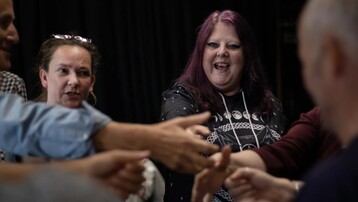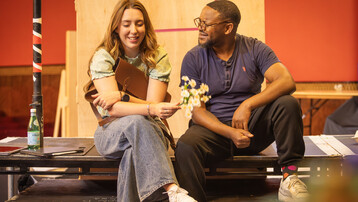News Story
At the start of the rehearsal period for Tutankhamun's Shoes, we asked Lysanne Van Overbeek (director of the piece) a few questions about her career, the process of directing and what she is looking forward to about our upcoming children's opera. Read this interview below …
Hi Lysanne! So, what are your current and past ETO roles?
I am currently directing Tutankhamun’s Shoes for ETO, a production which will have a run at the Polka Theatre and then tour across the UK to different schools and museums. The production has been written by Robin Norton-Hale and (composed by) Rosabella Gregory and tells a fictionalised version of Tutankhamun’s life and of those who found his tomb.
Before directing this production, I was staff director for ETO on three seasons: The ETO at Home season in spring 2021, the Autumn tour of Amadigi and the Spring 2022 tour, which included La Boheme, The Golden Cockerel and the St. John Passion.
What has it been like to work with ETO?
In my time with ETO I have learned a lot about opera and what it requires to take these big productions on tour. There are so many extra factors to consider, such as durability and stamina. You want the production to be just as exciting on opening night in Hackney as the final night three months later on the other side of the country. Getting to share this work with adults and children all over the country has been an incredible privilege and learning experience and has informed my current work hugely.
What are your prior experiences in opera and the arts? How did you get into directing?
I have always wanted to work in the arts. When I was very young I wanted to be a singer. Then I discovered theatre and fell in love. I trained in Musical Theatre from the age of 10 and went on to do a degree at Trinity Laban. Once I graduated and began working as an actress, I made a fatal discovery: I hated performing. I loved the creation and rehearsals, just not being on stage. So I decided to try some other things out and landed a job as assistant director on the Young Artists programme at Longborough Festival Opera and loved it. It felt like coming home. Since then I’ve worked for across the UK and Europe and started directing my own work a few years back.
What are the responsibilities of being a director?
In my eyes directing is very similar to puzzling. When I start a project, the first thing to do is research. I need to learn as much about the piece as possible and start my own game of Cluedo. Why does a character sing a specific aria or even a specific note? Why is one note longer than the other, and why has the composer chosen an oboe to do a solo here? Next, I work with a designer and sometimes other members of the team, like a movement director, lighting designer or dramaturg, to create a concept. Why are we telling this story? How are we going to tell it? What are the themes we want to highlight and what do we want it all to look like? Once all of that has been decided, rehearsals begin. During this time, the Musical Director and I will be working with the performers to bring the piece to life. We do more puzzling and figure out what makes these characters tick. We play, we try stuff and sometimes the decisions I made in advance really don’t work, so we try other stuff. This process can last anything between a few days and a few months. Finally, we get to the theatre and get to put it all together with lights, set and orchestra. This is where it suddenly becomes magic, when we can finally put it in front of an audience.
Making art in theatre is different than making a painting or writing music. Theatre is about collaboration and teamwork. So when an audience finally gets to see our “painting” after months of hard work, it’s an incredible feeling. This amazing group of people came together and made something wonderful and I get to be a part of that, to facilitate that. That is the best part of my job.
What are you looking forward to about directing Tutankhamun's Shoes?
Robin and Rosabella have written an incredible piece about storytelling. 'How do we tell our own stories and what is our place in the world?' Big questions that everyone has thought about, and children do daily. I think a lot of children will relate to at least one character in the show. I also love the challenge of making work that can fit anywhere, which is touring by definition. Bettina and I wanted to make a set that would feel magical, whether it was in a theatre or in a school hall. Can you imagine seeing an Egyptian tomb where you usually have your school dinners? If we get to inspire one child to love music or want to learn an instrument, I think we’ve done a good job.
In your opinion, how is directing a children's opera different to directing an opera aimed at older audiences?
There aren’t many differences. The performances still need to be honest, truthful and the production needs to be entertaining whether it is a fairytale, a tragedy or something funny. There is one big difference: children are incredibly honest, which can be brutal. If they don’t like it, you’ll know it. This means we have to work harder and there is no opportunity to sit back. It is a challenge for the creative team and the performers, and it makes for some really exciting work if you commit to it.
What is one piece of advice you would give to someone wanting to direct an opera?
Don’t be afraid of it. Opera can seem daunting, there are so many preconceptions about what an opera should be and what you should know before you start. But in the end, opera is about telling stories, about relationships and humanity. Every aspect of the production should come together to do just that. Just like in any other form of theatre. It’s about collaboration and all aspects coming together.


